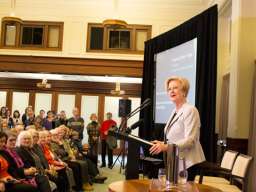Triggs urges people fight for separation of powers

From left, Mattew Zagor (ANU College of Law), Dr Renata Grossi (Fellow, Freilich Foundation), Valmae Freilich (foundation co-founder), Prof. Gillian Triggs, Helen Watchirs (ACT Human Rights Commissioner) and Daryl Carp (Director, Museum of Australian Democracy.)
Australian Human Rights Commission President, Professor Gillian Triggs, was given a standing ovation on Monday before her lecture on the 800th anniversary of the Magna Carta.
Professor Triggs was the guest speaker for the Freilich Foundation’s 10th Alice Tay Lecture in Law and Human Rights at the Museum of Australian Democracy.
An international law specialist, Professor Triggs gave a potted history of the legal document and why it remains a vital part of Australia’s legal heritage, despite being drawn up by English barons centuries ago.
“While parliament, evolving from this slender idea of common counsel, took many centuries to evolve, the idea of a common counsel to advise the king was sewn,” Professor Triggs said.
The Magna Carta’s technical provisions were not so important today, rather its “iconic power that informs my concern that the supremacy of the law over the executive is under threat in Australia’s contemporary democracy,” Professor Triggs added.
Since she became commission president more than three years ago, Professor Triggs has become increasingly concerned about the “decline in the effectiveness of parliament and the diminution of the role of the judiciary, and a corresponding role in executive discretion all too often exercised without independent scrutiny.
“For our democracy rests upon three institutions – the executive government, parliament and the judiciary. If the separation of these powers is distorted, democracy is at risk.
“Power must be exercised according to the rule of law, the majority cannot abuse the rights of the minority.”
Professor Triggs outlined laws passed by Australia’s major parties over the past 14 years which, in her view, “threaten some of the most fundamental rights and freedoms that we have inherited from our common law tradition.”
“Indeed, respective governments have been remarkably successful in persuading parliaments to pass laws that are contrary, even explicitly contrary, to common law rights and to the international human rights regime to which Australia is a party,” Professor Triggs said.
Amid taking questions from the audience, Professor Triggs said she and her colleagues deeply appreciated support they have received from across the country.
“At the commission we’ve received so many emails and cards and letters and flowers, in fact so many flowers I think I must have died,” she quipped.
“What we’re wanting is for those people who are taking the time to contact us will they please contact their backbenchers.
“That brings me back to my core point that I wanted to say today. Let’s bring the pendulum back to the power of parliament, to our elected representatives.
“That’s the system we’ve got, we believe in it and it usually works. But we’re in a parlous position at the moment. That’s where your power becomes effective.”


